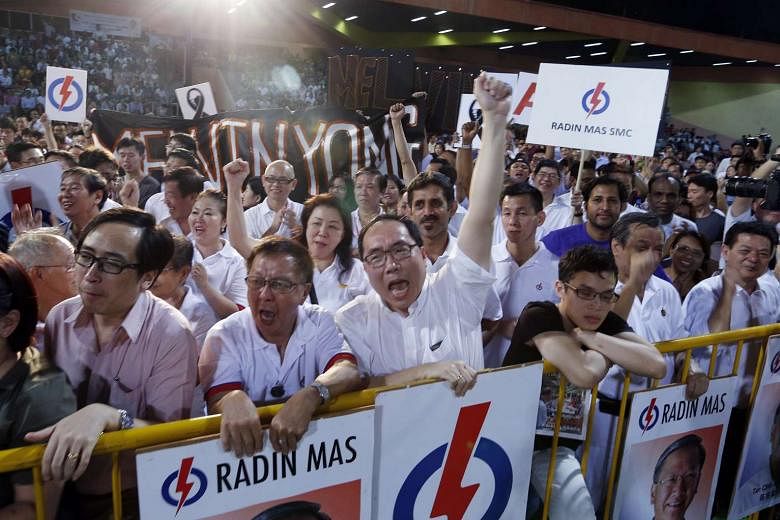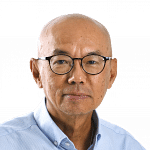It has taken 50 years for Singapore to have a general election where every single seat is being contested.
It has taken nine days to show what such an election might reveal about the state of politics here.
I have attended rallies, followed some of the candidates around, read all I could in the mainstream and alternative media, and watched countless videos.
It has been no holds barred from all sides - every party keen to let voters know not just what it stands for and its plans, but also the failings and weaknesses of its opponents.
I listen especially intently when they attack the other party or candidate.
Let it all hang out, I say, because I want to know what is the worst you can say about the other side.
That is when I might discover something I did not know before.
The People's Action Party (PAP)? It is arrogant, out of touch with ordinary people, and does not believe an opposition is necessary for Singapore's continued success.
The Workers' Party (WP)? It cannot be trusted to even run a town council, its MPs are docile as a mouse in Parliament. And don't believe its mantra that it does not want to form the Government, eventually.
The Singapore Democratic Party? Check out the troublesome past of its leader Chee Soon Juan and beware how its policies might bankrupt the country.
As with most election rhetoric, you have to discount some of the expected exaggeration, but the accusers also know that if they are not without some substance, their message will not stick.
But if these allegations are the worst that the parties can say about their opponents, I think politics here is doing all right.
No one is being accused of being corrupt, of stashing large amounts of money in his personal account, of gross abuse of power, or of racial or religious insensitivity. Of course, there has been the usual rubbish and unfair things being said, especially online, but that is to be expected in any election.
It has often been said that despite Singapore's economic success and the high level of education here, its politics is stuck in a time warp.
The 2011 General Election, when the WP won in Aljunied GRC, signalled the beginning of the political change that was inevitable as Singapore society matured.
But what sort of transition will it be? A general election is one of the best ways of answering the question, and this one had plenty to offer.
One important indicator of the change: Who are the people willing to step forward to make it happen?
Looking at the candidates, it is a mixed bag but the two main parties offer interesting insights in their line-ups.
The PAP's slate does not depart much from its usual high standards though there is noticeably more from the private sector this time round. No change, too, in its list of high-fliers from the public sector meant for higher office, if they are elected.
But no one has stood out and captured the public imagination, not during these nine days, at least.
Perhaps, it is part of the party DNA, that its top leadership charge from the front and dominate the campaigning.
But the consequence is that its new stars operate in their shadows, reinforcing the perception that it is a top-down party run on very traditional lines.
For the WP's line-up, there isn't the same wow factor created when it introduced Mr Chen Show Mao in 2011.
Perhaps it is also a measure of the raised expectations of the party that when its new stars included lawyers, a university professor and other professionals, it didn't make people sit up as much as they did four years back.
But because the WP is a smaller party, these new candidates get greater exposure from their rally speeches and walkabouts than their counterparts in the ruling party.
It makes people view the WP as a more exciting party for younger Singaporeans to join because it comes across as fresher and more daring.
The difference between an incumbent and a startup, if you like.
This round-up would not be complete without mentioning Dr Chee of the SDP.
Despite his troubled past - and many still distrust him - he was undoubtedly the unlikely comeback of the hustings.
The new political normal might offer him another chance, but it can also subject him to closer scrutiny from social media and the 24-hour news cycle.
So, finally it is Cooling-off day and to the polls on Sept 11.
This day belongs to the voter, for him to consider quietly, when no campaigning is allowed, who he wants to vote for.
A large part of this reflection should be directed inwards because, ultimately, this election is about you - the people of Singapore - your expectations and what you want of your elected leaders.
You have to know yourself before you can decide who you want to vote for.
This isn't as straightforward as it might seem because the greatest change that has taken place in Singapore especially over the last 15 years has been inside people's head - particularly their attitude towards authority and their place in the social hierarchy.
You have been the biggest change agent in all this, not the parties or their candidates.
I can see some of it in the passion and commitment among party volunteers and those who attend the rallies.
The people's spirit and pysche isn't evident just in the cheering during the National Day parade or when singing its songs.
It's also in full display when people support the causes they believe in, that matter to the country's well-being.
I don't think there is enough understanding of the implications of this change in the electorate or what will follow as a result.
This general election should provide some of the answers.


